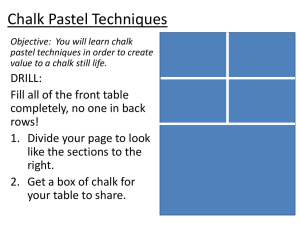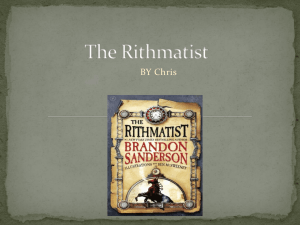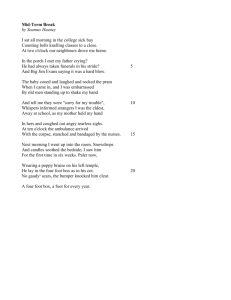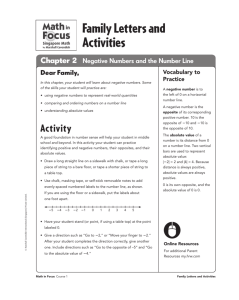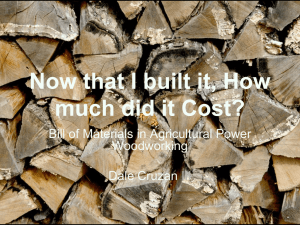My Left Foot
advertisement
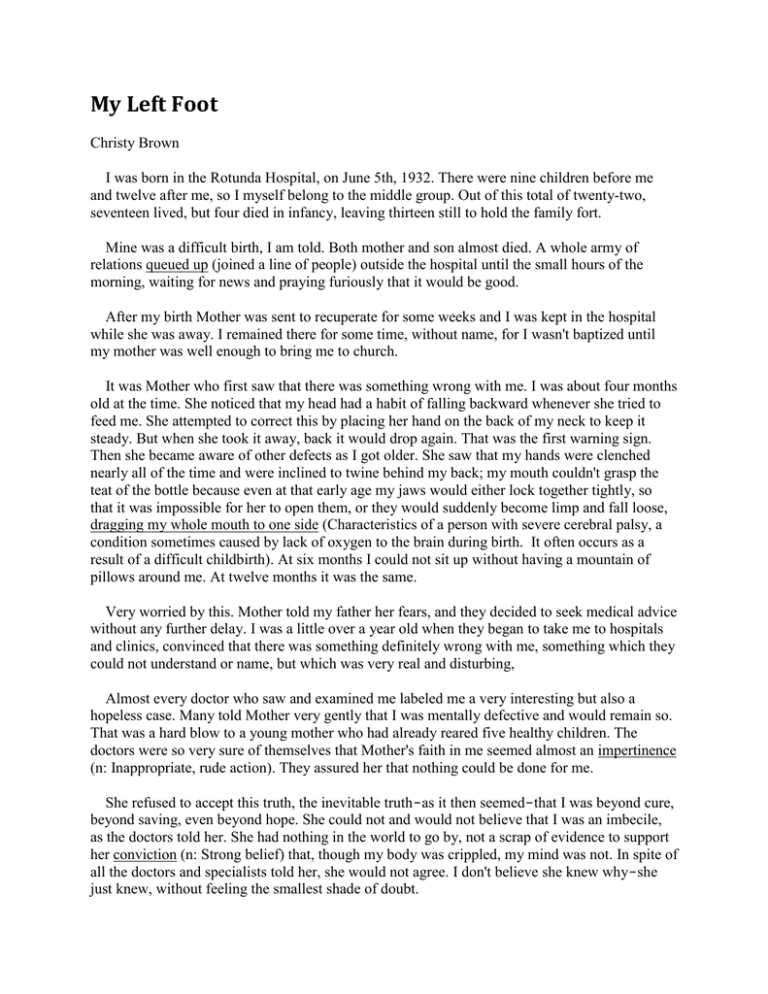
My Left Foot Christy Brown I was born in the Rotunda Hospital, on June 5th, 1932. There were nine children before me and twelve after me, so I myself belong to the middle group. Out of this total of twenty-two, seventeen lived, but four died in infancy, leaving thirteen still to hold the family fort. Mine was a difficult birth, I am told. Both mother and son almost died. A whole army of relations queued up (joined a line of people) outside the hospital until the small hours of the morning, waiting for news and praying furiously that it would be good. After my birth Mother was sent to recuperate for some weeks and I was kept in the hospital while she was away. I remained there for some time, without name, for I wasn't baptized until my mother was well enough to bring me to church. It was Mother who first saw that there was something wrong with me. I was about four months old at the time. She noticed that my head had a habit of falling backward whenever she tried to feed me. She attempted to correct this by placing her hand on the back of my neck to keep it steady. But when she took it away, back it would drop again. That was the first warning sign. Then she became aware of other defects as I got older. She saw that my hands were clenched nearly all of the time and were inclined to twine behind my back; my mouth couldn't grasp the teat of the bottle because even at that early age my jaws would either lock together tightly, so that it was impossible for her to open them, or they would suddenly become limp and fall loose, dragging my whole mouth to one side (Characteristics of a person with severe cerebral palsy, a condition sometimes caused by lack of oxygen to the brain during birth. It often occurs as a result of a difficult childbirth). At six months I could not sit up without having a mountain of pillows around me. At twelve months it was the same. Very worried by this. Mother told my father her fears, and they decided to seek medical advice without any further delay. I was a little over a year old when they began to take me to hospitals and clinics, convinced that there was something definitely wrong with me, something which they could not understand or name, but which was very real and disturbing, Almost every doctor who saw and examined me labeled me a very interesting but also a hopeless case. Many told Mother very gently that I was mentally defective and would remain so. That was a hard blow to a young mother who had already reared five healthy children. The doctors were so very sure of themselves that Mother's faith in me seemed almost an impertinence (n: Inappropriate, rude action). They assured her that nothing could be done for me. She refused to accept this truth, the inevitable truth-as it then seemed-that I was beyond cure, beyond saving, even beyond hope. She could not and would not believe that I was an imbecile, as the doctors told her. She had nothing in the world to go by, not a scrap of evidence to support her conviction (n: Strong belief) that, though my body was crippled, my mind was not. In spite of all the doctors and specialists told her, she would not agree. I don't believe she knew why-she just knew, without feeling the smallest shade of doubt. Reading Strategy: What do you think is Brown's purpose in focusing so strongly on his mother's belief that he was not hopeless? Finding that the doctors could not help in any way beyond telling her not to place her trust in me, or, in other words, to forget I was a human creature, rather to regard me as just something to be fed and washed and then put away again, Mother decided there and then to take matters into her own hands. I was her child, and therefore part of the family. No matter how dull and incapable I might grow up to be, she was determined to treat me on the same plane as the others, and not as the "queer one" in the back room who was never spoken of when there were visitors present. That was a momentous decision as far as my future life was concerned. It meant that I would always have my mother on my side to help me fight all the battles that were to come, and to inspire me with new strength when I was almost beaten. But it wasn't easy for her because now the relatives and friends had decided otherwise. They contended that I should be taken kindly, sympathetically, but not seriously. That would be a mistake. "For your own sake," they told her, "don't look to this boy as you would to the others; it would only break your heart in the end." Luckily for me, Mother and Father held out against the lot of them. But Mother wasn't content just to say that I was not an idiot: she set out to prove it, not because of any rigid sense of duty, but out of love. That is why she was so successful. At this time she had the five other children to look after besides the "difficult one," though as yet it was not by any means a full house. They were my brothers, Jim, Tony, and Paddy, and my two sisters, Lily and Mona, all of them very young, just a year or so between each of them, so that they were almost exactly like steps of stairs. Four years rolled by and I was now five, and still as helpless as a newly born baby. While my father was out at bricklaying, earning our bread and butter for us, Mother was slowly, patiently pulling down the wall, brick by brick, that seemed to thrust itself between me and the other children, slowly, patiently penetrating beyond the thick curtain that hung over my mind, separating it from theirs. It was hard, heartbreaking work, for often all she got from me in return was a vague smile and perhaps a faint gurgle. I could not speak or even mumble, nor could I sit up without support on my own, let alone take steps. But I wasn't inert (adj: lacking the power to move; inactive) or motionless. I seemed, indeed, to be convulsed with movement, wild, stiff, snakelike movement that never left me, except in sleep. My fingers twisted and twitched continually, my arms twined backwards and would often shoot out suddenly this way and that, and my head lolled and sagged sideways. I was a queer, crooked little fellow. Mother tells me how one day she had been sitting with me for hours in an upstairs bedroom, showing me pictures out of a great big storybook that I had got from Santa Claus last Christmas and telling me the names of the different animals and flowers that were in them, trying without success to get me to repeat them. This had gone on for hours while she talked and laughed with me. Then at the end of it she leaned over me and said gently into my ear: "Did you like it, Chris? Did you like the bears and the monkeys and all the lovely flowers? Nod your head for yes, like a good boy." But I could make no sign that I had understood her. Her face was bent over mine hopefully. Suddenly, involuntarily, my queer hand reached up and grasped one of the dark curls that fell in a thick cluster about her neck. Gently she loosened the clenched fingers, though some dark strands were still clutched between them. Then she turned away from my curious stare and left the room, crying. The door closed behind her. It all seemed hopeless. It looked as though there was some justification for my relatives' contention (n: Statement that one argues for) that I was an idiot and beyond help. Literary Focus: What is the significance of this moment? They now spoke of an institution. "Never!" said my mother almost fiercely, when this was suggested to her. "I know my boy is not an idiot; it is his body that is shattered, not his mind. I'm sure of that." Sure? Yet inwardly, she prayed God would give her some proof of her faith. She knew it was one thing to believe but quite another thing to prove. I was now five, and still I showed no real sign of intelligence. I showed no apparent interest in things except with my toes-more especially those of my left foot. Although my natural habits were clean, I could not aid myself, but in this respect my father took care of me. I used to lie on my back all the time in the kitchen or, on bright warm days, out in the garden, a little bundle of crooked muscles and twisted nerves, surrounded by a family that loved me and hoped for me and that made me part of their own warmth and humanity. I was lonely, imprisoned in a world of my own, unable to communicate with others, cut off, separated from them as though a glass wall stood between my existence and theirs, thrusting me beyond the sphere of their lives and activities, I longed to run about and play with the rest, but I was unable to break loose from my bondage. Then suddenly, it happened! In a moment everything was changed, my future life molded into a definite shape, my mother's faith in me rewarded, and her secret fear changed into open triumph. It happened so quickly, so simply after all the years of waiting and uncertainty, that I can see and feel the whole scene as if it had happened last week. It was the afternoon of a cold, gray December day. The streets outside glistened with snow, the white sparkling flakes stuck and melted on the windowpanes and hung on the boughs of the trees like molten silver. The wind howled dismally, whipping up little whirling columns of snow that rose and fell at every fresh gust. And over all, the dull, murky sky stretched like a dark canopy, a vast infinity of grayness. Inside, all the family were gathered round the big kitchen fire that lit up the little room with a warm glow and made giant shadows dance on the walls and ceiling. In a corner Mona and Paddy were sitting, huddled together, a few torn school primers (small books for teaching young children reading, writing, and arithmetic) before them. They were writing down little sums onto an old chipped slate, using a bright piece of yellow chalk. I was close to them, propped up by a few pillows against the wall, watching. It was the chalk that attracted me so much. It was a long, slender stick of vivid yellow. I had never seen anything like it before, and it showed up so well against the black surface of the slate that I was fascinated by it as much as if it had been a stick of gold. Suddenly, I wanted desperately to do what my sister was doing. Then-without thinking or knowing exactly what I was doing, I reached out and took the stick of chalk out of my sister's hand-with my left foot. I do not know why I used my left foot to do this. It is a puzzle to many people as well as to myself, for, although I had displayed a curious interest in my toes at an early age, I had never attempted before this to use either of my feet in any way. They could have been as useless to me as were my hands. That day, however, my left foot, apparently by its own volition (n:The act of using the will), reached out and very impolitely took the chalk out of my sister's hand. I held it tightly between my toes, and, acting on an impulse, made a wild sort of scribble with it on the slate. Next moment I stopped, a bit dazed, surprised, looking down at the stick of yellow chalk stuck between my toes, not knowing what to do with it next, hardly knowing how it got there. Then I looked up and became aware that everyone had stopped talking and was staring at me silently. Nobody stirred. Mona, her black curls framing her chubby little face, stared at me with great big eyes and open mouth. Across the open hearth (fireplace), his face lit by flames, sat my father, leaning forward, hands outspread on his knees, his shoulders tense. I felt the sweat break out on my forehead. My mother came in from the pantry with a steaming pot in her hand. She stopped midway between the table and the fire, feeling the tension flowing through the room. She followed their stare and saw me in the corner. Her eyes looked from my face down to my foot, with the chalk gripped between my toes. She put down the pot. Then she crossed over to me and knelt down beside me, as she had done so many times before. "I'll show you what to do with it, Chris," she said, very slowly and in a queer, choked way, her face flushed as if with some inner excitement. Taking another piece of chalk from Mona, she hesitated, then very deliberately drew, on the floor in front of me, the single letter "A." "Copy that," she said, looking steadily at me. "Copy it, Christy." I couldn't. I looked about me, looked around at the faces that were turned towards me, tense, excited faces that were at that moment frozen, immobile, eager, waiting for a miracle in their midst. The stillness was profound. The room was full of flame and shadow that danced before my eyes and lulled my taut (adj. High strung) nerves into a sort of waking sleep. I could hear the sound of the water tap dripping in the pantry, the loud ticking of the clock on the mantel shelf, and the soft hiss and crackle of the logs on the open hearth. I tried again. I put out my foot and made a wild jerking stab with the chalk which produced a very crooked line and nothing more. Mother held the slate steady for me. "Try again, Chris," she whispered in my ear. "Again." I did. I stiffened my body and put my left foot out again, for the third time. I drew one side of the letter. I drew half the other side. Then the stick of chalk broke end I was left with a stump. I wanted to fling it away and give up. Then I felt my mother's hand on my shoulder. I tried once more. Out went my foot. I shook, I sweated and strained every muscle. My hands were so tightly clenched that my fingernails bit into the flesh. I set my teeth so hard that I nearly pierced my lower lip. Everything in the room swam rill the faces around me were mere patches of white. But-I drew it-the letter "A". There it was on the floor before me. Shaky, with awkward, wobbly sides and a very uneven center line. But it was the letter "A." I looked up. I saw my mothers face for a moment, tears on her cheeks. Then my father stooped and hoisted me onto his shoulder. Why is this moment so significant? I had done it! It had started-the thing that was to give my mind its chance of expressing itself. True, I couldn't speak with my lips. But now I would, speak through something more lasting than spoken words--written words. That one letter, scrawled on the floor with a broken bit of yellow chalk gripped between my toes, was my road to a new world, my key to mental freedom. It was to provide a source of relaxation to the tense, taut thing that was I, which panted for expression behind a twisted mouth. Guide for Responding Literature and Your Life How would you feel if you were unable to communicate with your family or friends? Reader's Response Which person do you admire most in this selection? Why? Thematic Focus What qualities enabled Christy Brown - and his mother- to overcome his isolation? Questions for Research What one question relevant to this selection could you research? Check Your Comprehension 1. What were the first signs that there was something wrong with Christy? 2. What was the doctor's conclusion about Christy's case? 3. How does Christy's mother respond to the doctors' diagnosis? 4. How did Christy's brothers and sisters treat him? 5. What did Christy do that changed other people's impression of him? http://www2.selu.edu/Academics/Faculty/scraig/Brown.html. Web. 21 July 2011.
